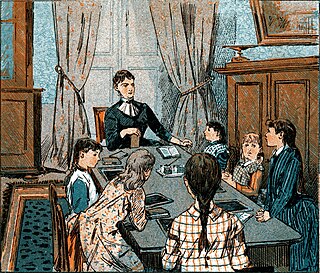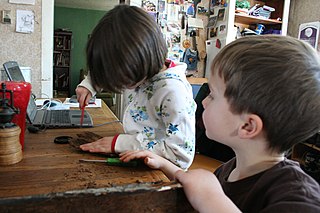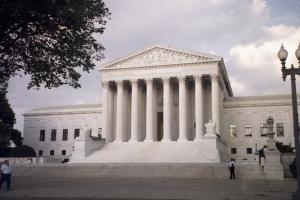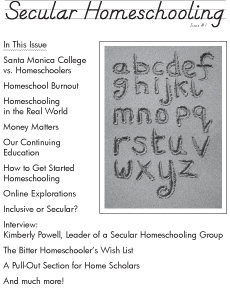Peter Kowalke | |
|---|---|
| Born | February 6, 1979 |
| Nationality | American |
| Occupation |
|
| Website | www.peterkowalke.com |
Peter Kowalke (born February 6, 1979) is an American unschooling advocate best known for his work on grown homeschoolers and the lasting influence of homeschooling. He was one of the first authors to explore the lasting influence that homeschooling has on a person in terms of identity, and produced a large body of work on the topic from 1994 until 2013, after which he stepped back from the homeschooling community to focus on contextualizing the Indian Advaita Vedanta philosophy for American culture.
During his years as a homeschooling advocate, Kowalke was a columnist and writer on grown homeschooler issues for Home Education Magazine (1997-2002), Life Learning magazine (2004-2008) and Home Educator’s Family Times (2004-2006). He spoke regularly at homeschooling conferences in the U.S. and abroad, and later started The Unschooler Experiment (2010-2013), a web magazine and podcast for unschoolers, by unschoolers. Kowalke also worked for pioneering homeschooling umbrella school, Clonlara (2003-2004), and Indian homeschooling advocates, Shikshantar Andolan (2004-2005). He himself was homeschooled until college.
His most notable work in the homeschooling community was his 2001 documentary, Grown Without Schooling (2001), [1] [2] the first documentary about grown homeschoolers and only the second documentary ever made about homeschooling (the first being Inventing a Girl. [3] The documentary was roundly praised in the homeschooling community for its accurate but sometimes unvarnished look at what it means to grow up outside of the school system. The documentary drew strong praise from many of the leading home education personalities of the day, including Teenage Liberation Handbook author, Grace Llewellyn, prolific education author, Linda Dobson, and former Growing Without Schooling magazine editor, Susannah Sheffer. Former publisher Holt Associates publisher and homeschooling speaker, Pat Farenga, used clips from the documentary in his talks for many years after the film made its debut.
Major media outlets such as The New York Times , [4] BBC, [5] The Boston Globe [ citation needed ], CNN,[ citation needed ] and The Times of India [ citation needed ] have interviewed Kowalke for his work on homeschooling.

Homeschooling or home schooling, also known as home education or elective home education (EHE), is the education of school-aged children at home or a variety of places other than a school. Usually conducted by a parent, tutor, or an online teacher, many homeschool families use less formal, more personalized and individualized methods of learning that are not always found in schools. The actual practice of homeschooling can look very different. The spectrum ranges from highly structured forms based on traditional school lessons to more open, free forms such as unschooling, which is a lesson- and curriculum-free implementation of homeschooling. Some families who initially attended a school go through a deschool phase to break away from school habits and prepare for homeschooling. While "homeschooling" is the term commonly used in North America, "home education" is primarily used in Europe and many Commonwealth countries. Homeschooling should not be confused with distance education, which generally refers to the arrangement where the student is educated by and conforms to the requirements of an online school, rather than being educated independently and unrestrictedly by their parents or by themselves.

Unschooling is an informal learning that advocates learner-chosen activities as a primary means for learning. Unschoolers learn through their natural life experiences including play, household responsibilities, personal interests and curiosity, internships and work experience, travel, books, elective classes, family, mentors, and social interaction. Often considered a lesson- and curriculum-free implementation of homeschooling, unschooling encourages exploration of activities initiated by the children themselves, believing that the more personal learning is, the more meaningful, well-understood and therefore useful it is to the child. While courses may occasionally be taken, unschooling questions the usefulness of standard curricula, fixed times at which learning should take place, conventional grading methods in standardized tests, forced contact with children in their own age group, the compulsion to do homework, regardless of whether it helps the learner in their individual situation, the effectiveness of listening to and obeying the orders of one authority figure for several hours each day, and other features of traditional schooling in the education of each unique child.
Home education in the United Kingdom of Great Britain and Northern Ireland is often termed "elective home education" ("EHE") to signify the independent nature of practice from state provisions such as education for children with ill-health provided by the local authority in the family home. EHE is a collective term used in the UK to describe education provided other than through the schooling system. Parents have a duty to ensure their children are educated but the education legislation in England and Wales does not differentiate between school attendance or education otherwise than at school. Scots education legislation on the other hand differentiates between public (state) school provision and education "by other means", which includes both private schooling and home education. The numbers of families retaining direct responsibility for the education of their children has steadily increased since the late 1970s. This increase has coincided with the formation of support groups such as Education Otherwise. Home education may involve an informal style of education described as unschooling, informal learning, natural or autonomous learning. Others prefer to retain a structured school at home approach sometimes referred to as homeschooling although the terms are often interchanged.

John Caldwell Holt was an American author and educator, a proponent of homeschooling, and a pioneer in youth rights theory.
Grace Llewellyn is an American educator, author, and publisher in the fields of youth liberation, unschooling and homeschooling. She is the founder of Lowry House Publishers, founder and director of Not Back To School Camp and The Hive: Self-Directed Learning for Teens.
Growing Without Schooling (GWS) was a homeschooling newsletter focused primarily on unschooling and deschooling. It was founded in 1977 by educator John Holt, and was published in Boston, Massachusetts. Reportedly the first such publication in the United States, it was read worldwide, and helped to catalyze the early growth and development of the homeschooling movement. Publication ceased in 2001 after 143 issues.
Deschooling is a term invented by Austrian philosopher Ivan Illich. Today, the word is mainly used by homeschoolers, especially unschoolers, to refer to the transition process that children and parents go through when they leave the school system in order to start homeschooling. It is a crucial process that is the basis for homeschooling to work, in which children should slowly break out of their school routine and mentality, develop the ability to learn via self-determination again, and find interests to decide what they want to learn in their first homeschool days. Depending on the type of person and time the child spent in the school system, this phase can last different lengths of time and may have different effects on the behavior of children. Especially in the first days of deschooling, it is often the case that children mainly want to recover from the school surroundings and therefore will generally sleep very long and refuse any kind of intentional learning and instead search for substitute satisfactions like watching TV or playing video games, very similar to the behavior during early school holidays. Moving on in this transition process, children may feel bored or cannot cope well with the missing daily structure, until they eventually find out how to make use of their time and freedom to find interests, which in the best case results in them voluntarily informing themselves about certain things they are interested in, whereupon homeschooling can start.

The Home School Legal Defense Association (HSLDA) is a United States-based organization that seeks to aid homeschooling families through legal representation. HSLDA describes itself as a "Christian organization."

Homeschooling in the United States of America constitutes the education of about 3.4% of U.S. students as of 2012. The number of homeschoolers in the United States has increased steadily over the past few decades since the end of the 20th century. In the United States, the Supreme Court has ruled that parents have a fundamental right to direct the education of their children. The right to homeschool is not frequently questioned in court, but the amount of state regulation and help that can or should be expected continues to be subject to legal debate.
The National Coalition of Alternative Community Schools, or NCACS, is an international organization based in the U.S. city of Ann Arbor, Michigan, dedicated to promoting alternative education. The organization was founded in 1978. It is known for its annual conferences, which bring together the community of community schools and homeschoolers and are held in a different location around the country each year. It also holds regional conferences. The NCACS also produces a directory of alternative community schools which it sells, as well as a quarterly newsletter.
Patrick Farenga is an American writer and educational activist. He is known as a leading advocate of the modern homeschooling movement which started in the 1970s.
Single-parent homeschooling is the practice of conducting homeschool by a parent who may be the sole breadwinner for the family. According to the peer-review journal Education Policy Analysis, based on the findings of the National Household Education Survey, of the National Center of Educational Statistics, between 1994 and 1999 the number of single-parent homeschools almost doubled. No further statistics are currently available. It is the general perception, by most homeschooling advocates, that most single-parent homeschools are led by a self-employed single parent, one that is receiving public assistance, or someone that has received a life insurance settlement. In some single-parent homeschool circles it is thought that most-single parent homeschools are run by parents who work full-time jobs outside the home. No statistics have been compiled to confirm or invalidate either supposition.

Secular Homeschooling was an American magazine for people who homeschool for reasons other than religion. It began as a quarterly, but became a bimonthly in July 2009. The magazine is no longer published and the final issue was released in 2011.
The legality of homeschooling in India and a plethora of alternative education schools spread over different states has been debated by educators, lawmakers, and parents since the passing of the Right of Children to Free and Compulsory Education Act (RTE) which makes formal education a fundamental right of every child between the ages of 6 to 14 and specifies minimum norms for schools. While the legality of homeschooling still remains a grey area, there have been petitions by parents and alternate schools in the past for granting relief. As per the Universal Declaration of Human Rights to which India is a signatory, quote: "Parents have a prior right to choose the kind of education that shall be given to their children."

Homeschooling is legal in many countries. Countries with the most prevalent homeschooling movements include Australia, Canada, New Zealand, the United Kingdom, and the United States. Some countries have highly regulated homeschooling programs as an extension of the compulsory school system; few others, such as Germany, have outlawed it entirely. In some other countries, while not restricted by law, homeschooling is not socially acceptable, or is considered undesirable, and is virtually non-existent.
Homeschooling in New Zealand is legal. The Ministry of Education reports annually on the population, age, ethnicity, and turnover of students being educated at home. The most recent statistics show:
"As at 1 July 2017, there were 6,008 home schooled students recorded in the Ministry of Education's Homeschooling database. These students belong to 3,022 families and represent 0.8% of total school enrolments as at 1 July 2017. Out of the 6,008 homeschoolers 67.3% were the aged 12 or under, 68.3% had been home-schooled for less than 5 years, and only 4.2% had been home-schooled for 10 years or more. European/Pākehā students are more likely to be homeschooled than any other ethnic group with 80.2% of all homeschoolers identifying as European/Pākehā compared to 50.1% of the total school population. Only 8.7% of homeschoolers identify as Māori compared to 24.0% of the total school population, 2.6% of homeschoolers identify as Pasifika compared to 9.8% of the total school population, and 2.2% of homeschoolers identify as Asian compared to 11.8% of the total school population. The ethnicity of 2.0% of homeschoolers is unknown."

Homeschooling in South Africa had been illegal, until it was recognized in 1996 under the South African School Legislation, since then it has grown significantly.
Susannah Sheffer is an author, editor, and activist, focusing on issues of education, prisons, and the death penalty. She is a leader in the unschooling, deschooling, and homeschooling movement. She served on the board of Holt Associates, edited the newsletter Growing Without Schooling (GWS) for many years, and edited the book A Life Worth Living: Selected Letters of John Holt. She is currently a staff member of North Star, an alternative to middle school and high school in Massachusetts.
In Canada, homeschooling has increased in popularity since the advent of the 21st century. It is legal in every province, with each province having its own regulations around the practice. In some provinces, funding is available. In 2016, the number of homeschooled children in Canada was approximately 60,000 ; this corresponds to approximately one in every 127 school-aged children. In 2020, the average growth rate of the practice amounted to more than 5 per cent per year. Canada has a large proportion of non-religiously motivated homeschoolers compared to some other countries. It is also one of three countries worldwide, along with the United States and South Africa, that hosts an organization with lawyers on staff which serves the legal needs of home educators.
In Australia, homeschooling is becoming increasingly popular. It is legal in all Australian states and territories, with each having its own regulations around the practice. Distance education is also prevalent for Australians who live in remote, rural areas. There are more than a dozen universities in Australia that support distance education for tertiary studies. Some Australians switch between distance education and classroom teaching. The number of homeschooled children and students who take distance education in Australia is approximately 30,000. The number of registered homeschoolers alone was 21,437 in 2019; this corresponds to 0.5 per cent of the total school population of Australia. In the 2010s, the average growth rate of the practice amounted to 9.4 per cent per year. The largest Christian school of distance education in Australia is the Australian Christian College, which has over 1,700 families with 4,000 students enrolled. Homeschooling generally enjoys a very good reputation in the Australian media and is widely seen as a flexible alternative form of education with good socialization opportunities in the community.